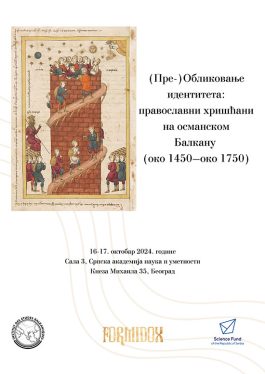Conference ’(Trans-)Formation of Identities: Orthodox Christians in the Ottoman Balkans (c.1450-c.1750)’
On Wednesday, October 16, at 10 a.m., the conference titled “(Trans-)Formation of Identities: Orthodox Christians in the Ottoman Balkans (c.1450–c.1750)” will begin at the SASA Hall 3.
This conference aims to explore the diverse ways Orthodox Christians in the Balkans identified themselves during this understudied period. The identification could have been shaped by shared categories such as religion, language, territory, and profession, or by relationships within a notional group.
Occasionally or periodically, the emphasis on these categories can be taken as a mark of identification. Because identity formation was often carried out by individuals or smaller groups, it is natural that the social and political backgrounds of these individuals influenced which categories or/and relationships were highlighted and how the group was defined.
Furthermore, the context in which these processes took place conditioned which feature would manifest. The most important context when identifications of Orthodox Christians took place in this period was the administrative and social organization of the Ottoman Empire. However, in this broad circle, various communities with different characteristics were identified. Therefore, we have worship practices and census taking, which created different groups and characterized them differently.
To delve into these layered processes, domestic and international researchers from a range of disciplines will gather over two days, October 16 and 17, to discuss possible approaches to studying this important topic and its placement within the broader regional context.
The conference is part of a project funded by the Science Fund of the Republic of Serbia. More information can be found at https://formidox.rs/.

